
Glenn Scobey Warner, most commonly known as Pop Warner, was an American college football coach at various institutions who is responsible for several key aspects of the modern game. Included among his innovations are the single and double wing formations, the three point stance and the body blocking technique. Fellow pioneer coach Amos Alonzo Stagg called Warner "one of the excellent creators". He was inducted as a coach into the College Football Hall of Fame as part of its inaugural class in 1951. He also contributed to a junior football program which became known as Pop Warner Little Scholars, a popular youth American football organization.
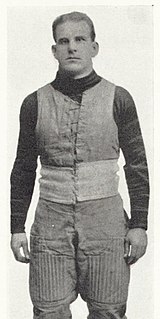
Charles Barthell Moran, nicknamed "Uncle Charley", was an American sportsman who gained renown as both a catcher and umpire in Major League Baseball and as a collegiate and professional American football coach.

Joseph Napoleon "Big Chief" Guyon was an American Indian from the Ojibwa tribe (Chippewa) who was an American football and baseball player and coach. He played college football at the Carlisle Indian Industrial School from 1912 to 1913 and Georgia Institute of Technology from 1917 to 1918 and with a number of professional clubs from 1919 to 1927. He was inducted into the Pro Football Hall of Fame in 1966 and the College Football Hall of Fame in 1971.

Harry Augustus Stuhldreher was an American football player, coach, and college athletics administrator. He played quarterback at University of Notre Dame from 1922 to 1924, where he was a three-time All-American and member of the legendary "Four Horsemen" backfield. After graduating from Notre Dame, Stuhldreher played professional football briefly with the Brooklyn Horsemen/Lions in 1926. He served as the head football coach at Villanova College—now known as Villanova University—from 1925 to 1935 and at the University of Wisconsin–Madison from 1936 to 1948, compiling a career college football record of 110–87–15. Stuhldreher was inducted into the College Football Hall of Fame as a player in 1958.

Ralph Fielding "Hutch" Hutchinson was an American football, basketball, and baseball player. He served as the head football coach at Dickinson College (1901), the University of Texas at Austin (1903–1905), the University of New Mexico (1911–1916), Washington & Jefferson College (1918), the University of Idaho (1919), and the Idaho Technical Institute (1920–1927), compiling a career college football record of 61–53–6. Hutchinson was also the head basketball coach at New Mexico (1910–1917), Idaho (1919–1920), and Idaho Technical (1926–1927), amassing a career college basketball record of 56–18, and the head baseball coach at Texas from 1904 to 1906 and at New Mexico from 1910 to 1917, tallying a career college baseball mark of 69–44–2.
Alfred E. Bull was an American football player, coach, rower, and dentist. He played football at the University of Pennsylvania and was selected as a center to the 1895 College Football All-America Team. Bull later served as the head football coach at the University of Iowa (1896), Franklin & Marshall College (1896–1897), Georgetown University (1900), Lafayette College (1903–1907), and Muhlenberg College (1908–1910), compiling a career college football record of 62–34–15.
Joseph Keith Lightner was an American football player and coach. He served as the 18th head football coach at Dickinson College in Carlisle, Pennsylvania and he held that position for three seasons, from 1923 until 1925. His record at Dickinson was 17–7–2. Lightner took over the second half of the 1923 season after B. Russell Murphy resigned with an 0–2 start.

Thomas Leo "Ted" St. Germaine was an American football player, coach, and lawyer. He served as the head football coach at Villanova College—now known as Villanova University—for one season, in 1913, compiling a record of 4–2–1. Germaine played professionally in the National Football League (NFL) during the 1922 season. That season, he joined the NFL's Oorang Indians, a team based in LaRue, Ohio, which was composed solely of Native Americans, and coached by Jim Thorpe. St, Germaine was qualified to play for the Indians since he was a Chippewa.
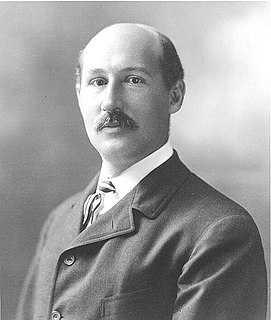
The 1913 College Football All-America team is composed of college football players who were selected as All-Americans for the 1913 college football season. The only two selectors who have been recognized as "official" selectors by the National Collegiate Athletic Association (NCAA) for the 1913 season are Walter Camp and the International News Service (INS). Camp's All-America Team was published in Collier's Weekly. The INS was founded in 1909 by William Randolph Hearst, and its sports editor Frank G. Menke selected the INS All-America team. Other sports writers, newspapers, coaches selecting All-America teams in 1913 included Harper's Weekly, Fielding H. Yost, and Parke H. Davis.

Isaac Seneca, Jr. was an All-American football player for the Carlisle Indian Industrial School. He was selected as an All-American halfback on the 1899 College Football All-America Team. He was the first Carlisle player and the first American Indian to be selected as an All-American. He was born in 1874 on the Cattaraugus Reservation in New York.

Bemus Pierce was an American football player and coach. He played as a guard in the 1890s and 1900s. Pierce played college football for the Carlisle Indian School teams from 1894 to 1898 and played professional football for the championship teams from the Homestead Library & Athletic Club of 1900 and 1901. He also played for the All-Syracuse team in 1902, the first indoor professional football team. Pierce served as the head football coach at the University of Buffalo in 1899, at the Carlisle Indian School in 1906, and at Kenyon College from 1908 to 1910.

Martin Frederick Wheelock (Oneida) was an Oneida football player in the United States who achieved a national reputation while playing American football for the Carlisle Indian School from 1894-1902. Captain of the team in 1899, Wheelock was selected as a first-team All-American by the New York Sun in 1899, a second-team All-American by Walter Camp in 1901, and to the All-University Team by the Philadelphia Inquirer in 1902. In later life, he worked as a blacksmith and farmer.
Frank Lone Star was a professional football player for the Columbus Panhandles in 1920. He played at the collegiate level at Carlisle Indian Industrial School.

The 1896 Wisconsin Badgers football team represented the University of Wisconsin in the 1896 Western Conference football season. In their first season under head coach Philip King, the Badgers compiled a 7–1–1 record, shut out six of nine opponents, outscored all opponents by a combined total of 206 to 30, and won the first Western Conference championship.
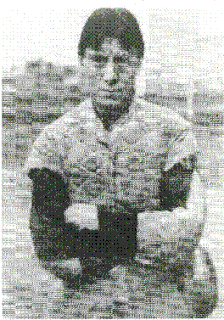
Frank Hudson was a Native American football player and coach. He was a member of the Laguna Pueblo tribe from New Mexico.
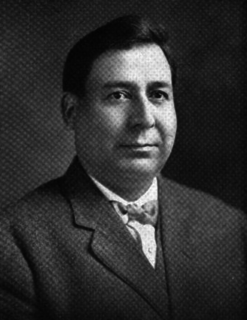
Dennison Wheelock was an internationally renowned Oneida band conductor and cornet soloist of the late 19th and early 20th centuries; he was also a composer. Wheelock was compared at the time to John Philip Sousa, and nominated to be bandmaster of the United States Marine Band. At the age of 40 he became an American Indian rights activist and attorney, and within several years was arguing cases for Indian nations at the United States Court of Claims and US Supreme Court.
John Arthur Hall was an American football player and coach. He played college football for the Yale Bulldogs football team and was selected as a consensus honoree on the 1897 College Football All-America Team. He also served as the head coach of the Carlisle Indians football team in 1898. Hall also played ice hockey on intercollegiate and amateur levels for Yale University and teams in New York City and Pittsburgh.
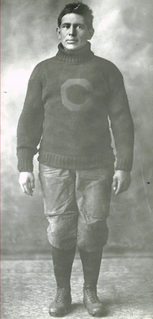
Herman Peter Hauser was a United States Native American football player. He played for the Haskell Indians football team from 1904 to 1905 and for the Carlisle Indians football team from 1906 to 1910 and was selected as a consensus first-team fullback on the 1907 College Football All-America Team. He was a multi-talented player who ran with the ball, handled place-kicking and punt returns, and has been credited as the first player in American football to throw a spiral pass.
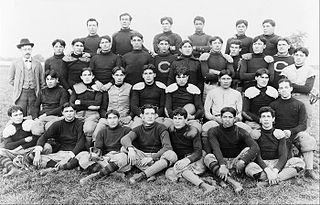
The 1899 Carlisle Indians football team represented the Carlisle Indians football team of the Carlisle Indian Industrial School during the 1899 college football season. The Indians were coached by Pop Warner in his 1st year as head coach. The team compiled a record of 9–2 and outscored opponents 383 to 46.
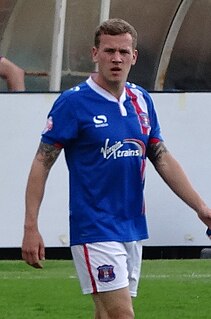
Thomas Patrick Miller is an English professional footballer who plays as a defender for Bury. He has formerly played for Dundalk, Newport County, Lincoln City and Carlisle United. He signed for Bury on 6 July 2018.

















